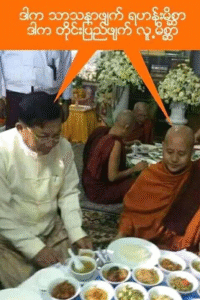Islamophobia and the Erosion of Empathy: A Reflection
(Feel free to share freely)
Islamophobia is now widespread among nearly all non-Muslims.
This is not about promoting Islam or proselytizing, but simply clarifying misconceptions. Yet, anyone who explains Islam—even non-Muslims—is accused of religious extremism and attacked with slurs. Just hearing the word “Islam” triggers anger in a growing segment of the Burmese population. These people have become devoid of empathy and rational consideration.
Even self-proclaimed liberals, human rights defenders, and scholars often lose their sense of critical reasoning when they hear the word “Islam.”
Several major factors contribute to this trend:
1) Media Manipulation: This issue is not limited to Myanmar—it is global. White nationalist politicians and media conglomerates intentionally manipulate narratives. While people of all religions and races commit crimes, Muslim perpetrators are branded as “Islamic terrorists,” while others are referred to only by name. Most of Myanmar’s media follows this bias. They are largely responsible for stoking fear and hate.
2) Divide-and-Rule Tactics by Authoritarian Regimes: The British colonizers mastered the strategy of divide and rule, sparking numerous global conflicts. In Myanmar, generations have grown up under such divisive governance. This has entrenched ethnic and religious prejudices and hierarchical mindsets. People mimic divisive behavior without questioning the original source of the problem. Education plays a significant role in reinforcing this mentality.
3) Extremist Religious Leaders: Whether Muslim or of other faiths, many modern religious leaders have deviated from their original missions of compassion. Instead of being spiritual guides, many have become economic and political tools. They manipulate religion for personal or political gain. This is evident across all major religions in Myanmar. Rather than promoting peace and collective well-being, these leaders prioritize their own group’s dominance.
4) Education and Lack of Freedom in Literature: Many Myanmar citizens grow up under a repressive educational system, often led by teachers who favor punishment over understanding. Students who don’t attend private tuitions face discrimination. Biases against certain ethnic or religious groups are common even in classrooms.
The higher education admission system is based on ethnicity and religion, not merit. As a result, capable youth are often forced to study abroad, where they remain due to discrimination at home. This leads to a brain drain, while domestic bureaucracies are populated by those who buy their way in. These officials, once in power, perpetuate corruption and discrimination. Departments such as the Ministry of Religious Affairs are especially guilty of institutionalizing religious and ethnic hate.
Even highly educated scholars from abroad are not immune. Many abandon critical thinking when it comes to Islam, falling victim to the same prejudices.
This post is getting long, so I will stop here. But many more reasons explain the spread of Islamophobia and the erosion of empathy.
If we truly love our country and care for future generations, we must work together to dismantle this harmful system.
Personally, I have begun writing a series titled “Understanding Islam and Myanmar Muslims for Non-Muslims.” I invite you to collaborate with me.
Love your people and faith—but also respect others. Love Myanmar, and let us treat each other with empathy and humanity.
Respectfully,
Arkar Oo (Myeik)
#peacefulsociety #myanmarmuslimsnewsnetwork #peacemaker #reminder #follower @highlight
Myanmar Muslims News Network
Published by U Aung San Oo






